It Started With A Kick
It Started With A Kick
A Look At Australian Footbag History
with current Australian Champion, Daniel Boyle
Table of Figures
Photos credited through the text
Figure 1- Australian Championships 2001- Page 3
Figure 2- Sydney Olympic Park- Page 4
Figure 3- Footbag Collection of Lotus from Elemental Footbags- Page 5
Figure 4- Homebake- Page 6
Figure 5- Jesse Malouf and Gareth Williams, Milo Demonstrations, Brisbane- Page 8
Figure 6- Daniel Boyle and Petr Stejskal (Czech Republic)- Page 10
Figure 7- Australia Day 2008 – Narooma Jam- Page 11
Figure 8- Phil Morrison in Action At The Easter Show- Page 12
Figure 9- Boyle’s Bag Is Full of Tricks- Page 13
Figure 10- Kicking in Freibourg, Switzerland- Page 14
Figure 11- On Stage At The Royal Easter Show- Page 15
Figure 12- Players gathered after 2010 National Championships- Page 16
Figure 13- Players warming up for the ACT Championships- Page 17
Figure 14- Footbag Net in Narooma- Page 18
Figure 15- Every Moment a Chance For Footbag- Page 18
This particular history will be more of an autobiographical reflection through my journey in the world of Footbag. Before we begin, I guess I should let all the readers know what Footbag is. Footbag is often known by the name “Hacky Sack”, which was an early brand of Footbags. The sport started in Portland, USA in 1972 (Goldberg, 2007). From early beginnings kicking a small beanbag like object around, the sport has developed into two main disciplines, Footbag Net, a game similar to volleyball using only the feet, and Freestyle Footbag, involving performing tricks around the Footbag. In Australia, Freestyle Footbag is the more popular discipline, and that will be the main focus of the history.
As for my own journey within Footbag, it has been quite a long journey. My first experience playing “hacky sack” was in early high school. A boy at school, his Mum owned one of those shops that sell weird candles and other junk, generally aimed at hippies. He brought in one, and we tried to kick it around. I got the most kicks that day, with three. I thought, this is fun. A couple of months down the track, my Dad came back from Melbourne with a last minute gift from the airport, it was one of these crocheted little balls, Made in Guatemala was what they all said. From there I continued trying to get more and more kicks.
My first experience with other Freestyle Footbag players was not until 2001, four years down the track. I was just starting to investigate the world of Freestyle, I had found the website footbag.org, the official site for the International Footbag Players Association, and had found out a competition was coming up. Funnily enough, this was actually the first ever competition in Australia.
Australian Footbag Championships
- December 7-9, 2001
- Sydney, New South Wales, Australia
- Contact:Lynton Stephens,
- mfcshred@hotmail.com, 0401916338
- (Prize money event)
- The championships are being held in conjuction with the extreme-games. The comp will be held over three days. Friday: Singles 5 minute timed Doubles freestyle Saturday: Freestyle singles heats Doubles 5 minute timed Sic 3 heats Sunday: Freestyle singles finals (held on the main stage) Sic 3 finals. Entry fee is 25 dollars (Australian) which allows free entry to the x-games on the Sunday. There will be $1000 (Australian) prizemoney.
Figure 1- Australian Footbag Championships 2001 from www.footbag.org
I sent an email through enquiring about the competition. There were many events, but I only entered the consecutive kicks contest. This was a competition going for five minutes, to see who could do the most kicks in a row. A drop would be penalised, as would the failure to change feet each kick. My technique was to exchange from my right toe to my left inside. I managed to win this competition and went back to school feeling very pleased with myself. My score was 495 with no drops and one penalty for not changing feet.

Figure 2- Sydney Olympic Park
Although back at school it was a good story, in the Footbag world, it was Lynton Stephens who was king. Lynton was Australia’s leading player at the time, a real pioneer of the sport who invented a number of tricks we know today. Lynton performed his routine dropless in front of a large crowd. Lynton told me he started kicking around 1996. “I was immediately fascinated by the beauty and technicality of the sport and also how new and esoteric it was. There seemed to be a lot of possibilities for it and I started aspiring to get as good as the guys I had seen on those videos.” (Stephens, 2011)
Although Lynton is considered by most to be the originator of the sport in Australia, I was surprised to find out this was not actually the case. Although Lynton can be thanked for putting Australia on the map in the freestyle scene, before his time, Footbag was happening in Australia.
Alan McKenzie, owner of the Wallaby G footbag company, actually competed at Worlds during the 1980s. Footbag Hall of Fame member Tim Vozar told me “I competed with Alan in the one pass consecutives in Boulder, Colorado in the late 80s”. Unfortunately Lynton never made it to Worlds though to compete with the other top players of the time.
Another Hall of Fame member, Scott “Mag” Hughes tells me that he’s not so sure Alan McKenzie was the man behind Wallaby G. “I want to say Michael Cummings was behind Wallaby G”. Mag came out to Australia to do a tour of schools in the 80s. “I was picked up in Sydney and we drove up into Queensland. Unfortunately his brother died, so he gave me the car and a schedule to do the demos. There was a frisbee player who helped me a lot, I can’t remember him though. Most of them were in recess breaks at schools, but there was one demo at a Surfer competition at Bondi Beach”.
Browsing through the previous events archived on Footbag.org, there are events dating back to 1997 in Western Australia, though no results are available, nor does the club come up again in subsequent years.

Figure 3 -Footbag Collection of Lotus from Elemental Footbags- A History in Itself
At the competition, I met a number of people, but the one I really bonded with was Ian Pritchard. We were the same age, and I think both of us felt a bit scared of the older guys. I don’t think either of us were over 18 yet, and the rest of the guys were keen to party later on. He had picked up the sport the same way as me, though he was a bit more advanced than me, and a much greater knowledge of the tricks. Ian is now the only player to have attended every Nationals, and has been the key organiser in the last two events. He is also the webmaster of the Ausfootbag website, which provides information about Australian Footbag.
In those days, there were only a few videos available, and to download them on dial up was an excruciating wait. Instead of looking at videos to learn, there were text based descriptions of each trick, which was sometimes hard for a kid from the country to figure out.
The next year, I had improved significantly, although I still wasn’t very good at the freestyle aspect.
This year HOMEBAKE is also very proud to announce the debut appearance of the NSW HACKY SACK / FOOTBAG CHAMPIONSHIPS with the best freestyle shredders from Australia spearheading this unique sporting event. Lynton Stephens (2001 Australian champion) will be there to demonstrate his skills as a Freestyle Hackysack/Footbag champ along with many other representatives from footbag clubs throughout Australia
Figure 4- Homebake from www.homebake.com.au
The next competition was the New South Wales Championships, held at the Homebake Music Festival in Sydney. For some reason there were no Nationals that year, even though Queensland, New South Wales and Victoria held a championship. I was planning to go to the music festival anyway, and going in the competition gave me a discounted ticket. I was disappointed that my first attempt in a “Sick 3” contest provided no results. In this particular contest, a player needs to hit a combination of 3 tricks in a row. From memory, there were ten attempts, and I didn’t hit any. This was still a good experience, as it was my first time in a freestlye competition, even though it was not a success.
The main organisers at the time were Steve Ramsey, he ran a company named Hostac. The company produced an instructional VHS with Lynton, “Footbag Assassin”. There was another company based in Queensland, Hot Potato, run by a man known as “Forra”. Then there was Lotus, based in Perth with Elemental Footbags. Interestingly enough, going to www.hotsac.com these days no longer brings up anything Footbag related, but the “most popular links” being with bankruptcy.
In a move that I hoped would mean I would be playing a lot more Footbag, I moved to Sydney from Bega in early 2003. Unfortunately the other players were all at uni, and their regular kicking times were during the week, while I was working full time. I stopped kicking regularly and I missed out on the East Coast Regionals in Melbourne and the Brisbane City Sessions. Before I had dropped off the radar, I attended the Big Day Out music festival, the first time I had been. Both Hotsac and Hot Potato had stands there, and I got to kick with Lynton as well as the Queensland guys.
In 2003, once again there was no National Championship. The big event that year was the East Coast Regionals, which was held in Melbourne as a preparation for the bigger tournament in 2004, which hosted a number of international stars. Lynton was still reigning supreme, with his combos much harder than the other competitors.
In 2004, I was still out of the scene, though I had moved to Canberra and by the end of the year had started getting back into the game. I missed the battle of some of the best players in the 2004 championships, with Ales Zelinka (Czech) and Johnny Murphy (NZ) taking first and second places. That year Dan Ednie went to his first World Championships, in Montreal, coming in 21st in the Routines. Since then, Australia has had at least one representative at the World Championships each year.
In 2005 I got my first pair of Adidas Rod Laver shoes. You might wonder what the great man of tennis has to do with Footbag, but what I have been wondering all these years, is why is the Rod Laver shoe not available in Australia? There are now a number of shoes designed for playing Footbag, but the Adidas Rod Laver is still the most commonly used. Unfortunately for new players in Australia, they must be shipped in from the USA. Ian Pritchard had bought a pair which were a little to small, so I bought them from him. This meant all the modifications had been made already. To improve the shoes for doing different tricks, Footbag players will actually slice into their shoes with a knife.
Soon after getting these shoes I got to play with Dylan Fry in Sydney, a world renowned player from Canada, and one of the best players I had seen. His style seemed, and still seems, effortless. It was not much longer that I met him again at the National Championships in Melbourne.
This was my first time competing in Melbourne, I have a feeling I came last in every event. I still had a great time in Melbourne though, and met some more players. Alex Urano and Jesse Malouf were two young kids that were getting into the game that seemed they were going to go from strength to strength. I stayed with a friend rather than at the hostel everyone else stayed at, which turned out to be a wise decision, the hostel was infested with bed bugs.
Later that year I gave my first demonstration. I can’t remember exactly what it was for, it was at some type of careers fair, but it went reasonably well, people seemed to like it, and I didn’t drop it too many times. Later in the year, Milo ran a big campaign, giving out footbags in their cereal boxes. Some players travelled the country in support of these, with Ken Somolinos coming out to visit. I still had not played with so many big time players and I was a bit overwhelmed in his presence at the time. I got to do a few demos on the Milo series in Sydney, but unfortunately I couldn’t show off to a home crowd, as no demonstrations were organised in Canberra. I have never met anyone who started playing Footbag by picking one up from a Milo cereal box.

Figue 5- Jesse Malouf and Gareth Williams, Milo Demonstrations, Brisbane. Photo by Jeremy O’Wheel
2006 and the Nationals were back in Melbourne. I did a bit better this time around, but I didn’t enjoy my time in Melbourne as much. I stayed with the same friend again, but I just had no money, so couldn’t afford to do everything I would have liked. I was also a bit disappointed with my routine, which had some very strong parts, but then about twelve drops in a row in the last thirty seconds.
That year I started a Footbag Club at the University, which got some more people slightly interested in Footbag. Although it was mainly made up of my friends looking for an excuse to drink beer, people were turning up each week, and we had a few small competitions. That year was my final year of university though, so the club failed to continue without me there. At the end of the year I started working as a tour guide at the Australian Institute of Sport. Each guide introduces themselves and the sport they play. Everyone always questioned what Footbag was, so I started giving a small demonstration on each tour. This has seen me demonstrate to thousands of people over the last few years.
Around this same time I met Nathan Cope for the first time. Like myself, Nathan was from the south coast, and had started kicking in high school, and had actually kicked with Lynton at the same Big Day Out that I had been to. I still wonder now if we could have powered along as South Coast pioneers of the game had we met earlier.
I finished 2006 on a Footbag note, travelling from Melbourne to Bendigo on New Year’s Eve to kick with Jamieson Hickingbotham, who definitely has one of the more interesting names in Australian Footbag. This was a great preparation for the 2007 Nationals which kicked off less than a week later in Hobart. Once again I was plagued with financial woes, but the old goods section of the 24 hour Salamanca Bakery kept me in good stead.
I hadn’t really trained for a routine at all, and it showed in my disastrous performance, which was mainly filled with drops. I improved on my previous efforts in some other events, but overall it was still disappointing. To show my inadequate preparation, I don’t think I even owned a Footbag at the time. The highlight of that year’s event was a great routine from Scott Kirchner. Scott had been a big organiser in Melbourne, and hadn’t been able to plan his routines, but this one was very impressive. A lot of us who had been in the game a while were really proud to see him do a routine we knew he was capable of.
Midway through 2007, I found myself living in Melbourne. I played Footbag a lot with Dan Ednie, the multiple national champion. He made me change my style, but I didn’t like the feeling of being coached. That’s something that I had always held dear about Footbag, it was not like a normal sport, it was completely Do It Yourself, you would just teach yourself and get there eventually.
At the time, Melbourne had quite a number of players. The Melbourne University club had started up, powered by Janis Lesinskis and Leon Schreuder, there were regular kicks each week, which had been going for a number of years. However, the turnouts were never particularly substantial. Dan took off to go to Worlds, where he became the first Australian to reach the finals at Worlds, taking 7th place. On his way he knocked out Canadian star Jorden Moir.
Just as I was leaving Melbourne, one of the last kicks I went to, there was the turnout I’d had a feeling I may see every week. All the old heroes like Lynton Stephens and Brendan Erskine. “Ah, Daniel, I remember your toe, inside style!” right through to some younger kids like Andrew McIntosh and James Yip. There would have been about fifteen players turned out to kick that day, which is normally the figure I say when asked how many people kick in Australia.
2008 was a new year and it kicked off with the first Narooma Jam. This was a lot of fun, and has continued along each year, marking the first event in the Australian Footbag calendar. The jam allowed a relaxed atmosphere, with no pressure for competition. We even got a run in the local paper, although midway through the story they got us confused with the national futsal, or indoor soccer competition happening in Canberra.
Not long after the Narooma Jam, Nathan Cope, Caroline Birch and myself all moved to Canberra around the same time. To begin things, none of us had a job and were all on the dole, which is of course, the best way to develop at any chosen sport.
Eventually we all moved into the workforce, but we all had casual jobs, which meant plenty of time for kicking. This was good news, as we were hosting the Nationals in Canberra. Unfortunately, it meant there was not a lot of money to go into the organisation of the competition, which turned out to be at times, disastrous.
However, this was the first time I had done a routine that I was really pleased with, and I ended up taking second place in the Routines event. On reflection that was a problem with the organisation, was that I had spent to much time playing Footbag, and not enough time organising.

Figure 6- Daniel Boyle and Petr Stejskal (Czech Republic) 2008 National Championships, Canberra
Photo by Caroline Birch
That year I started talking about the idea of going to Worlds. I didn’t really think I was good enough, but it sounded like a lot of fun. They were in Prague, which had been a huge success in 2003, the first Worlds outside North America. Caroline and Nathan both went, leaving me alone in Canberra, in the winter. Looking back now, I’m glad I didn’t go, as many people do not have fond memories of the tournament. Just like the Nationals, the Worlds was a bit of a shambles that year. The Berlin players stepped in almost immediately, to tell the Footbag community that the 2009 Worlds would be one not to miss.
By this time I had a full time job, and could start saving to go on my first ever overseas trip. Before that though, we as a Footbag community had some guests, and I had them as guests in my house as well. The first visitor came on New Years Day itself, and a couple of days later I went up to Sydney to kick with Flavio Löschter, from Switzerland. I invited him to stop by in Canberra, and a couple of days later there was a Wicked camper parked in the front yard for a few days. We had a lot of fun in our time in Canberra, he told me I must visit him in Switzerland, and it wasn’t long before I did.
We had pushed back the second Narooma jam from early in January to coincide with the Australia Day public holiday. Andrew Grant had come out to Australia on a working holiday visa, he had also come second in the Shred 30 event in Prague. We also had the French couple Max and Benoit, both excellent players. It was the best turnout we had, including international stars, however, that year there was no mention in the Narooma News.
I had taken a week off work after the Jam, and showed Andrew around the rest of the south coast. He had come out to Australia in search of surf, but unfortunately, while we were looking, Hughey was taking a rest. From the coast we came up to Canberra. Each day we had been following the Australian Open, and we timed it well, as the final was on the night we got back.

Figure 7- Australia Day 2009- Narooma Jam photo by Daniel Boyle. Clockwise Jeremy O’Wheel, Andrew Grant, Caroline Birch.
Andrew stayed a while in Canberra, you can read a blog about his travels on the Canadian Hackrifice website. He got a job on a surf camp as a cook, and became more obsessed with surfing. Unfortunately for him, he’s now back in Winnipeg, in the Canadian Prairies, and there’s not much surf abounding.
Nationals in 2009 were on in Sydney, back to square one, the same venue as the “X-Treme Games” back in 2001, the Hombebush Olympic complex. I managed to have a chance encounter with Andrew just days before the competition, he had said previously he couldn’t get out of work, but after a drunken haze, I convinced his bosses that he was the champion of the world, and he had to come to our competition. The next day he was on the train back to the camp to get his gear to compete.
2009 had the best field in many years, with New Zealand’s Phil Morrison flying out to join in the competition. Although New Zealand was having competitions before Australia, their scene has died off almost completely. However, Phil is still going strong in Christchurch, competing at Worlds every year, and being a regular fixture in the finals.

Figure 8- Phil Morrison in Action At The Easter Show- Photo by Lotus
There was also Jeremy O’Wheel, a long time Footbag player from Hobart who actually holds a number of world records. I knew I would be a long way down the line, but thought I may be in for an upset. The first day of competition was at the Royal Easter Show, and we had a large crowd watching us. I was reasonably happy with how I performed that day, though my main focus, the Routines event was held the next day. A Scubar induced hangover meant I was not in quite as good a condition.
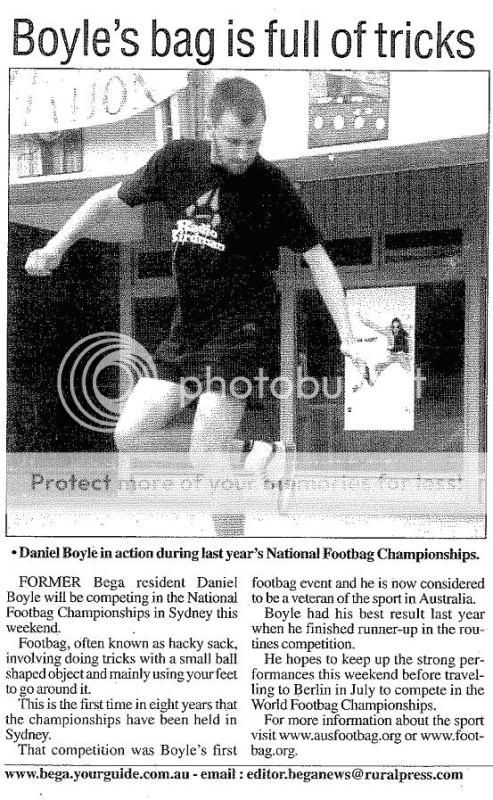
Figure 9-Boyle’s Bag Is Full of Tricks- Bega District News, April 17, 2009
I felt I was a winner though, as I had convinced some backpacker girls to come and watch our competition. On a rainy day and having to travel to the suburbs, I felt this was a great achievement. I ended up taking fourth in the routines event, behind the stars, but apart from Phil’s absolutely flawless routine, there were a lot of drops all round.
A few months later in was time to pack my backpack and head on overseas. Over one month I travelled through Germany, Switzerland, Austria and Czech Republic, mainly staying with Footbag players. In this time I got to play with many of the players, who I would see again at the World Championships in Berlin.

Figure 10- Kicking in Freibourg, Switzerland. Photo by Flavio Löschter
As with anything German, there was this typical efficiency with the tournament. Breakfast and lunch was part of your entry fee, the main hostel was next door to the event site, so you could almost roll out of bed and arrive immediately. There was also free entry to the swimming pool, what more could you want?
I made some really good friends there in Berlin, especially with Roy Klein from Israel, who we dubbed as an honorary Australian. The Austrians adopted me as one of their own, so much so that when I came out to do my routine, the announcer said “and now, Daniel Boyle, also from Austria” the judges, one from Austria, one from Australia, whispered in his ear… “oh, he’s from Australia, that’s a bit further away”.
I performed my same routine I had done at Nationals, but I was disappointed with my execution. I had hit it dropless before in practice, but my performance that day was nowhere near the standard I was hoping for. I came 5th in my pool out of 6 people, ranking me something around 67th in the World. Although there are most definitely more players than that who are better than me.
After that trip, I was hooked. I actually bought a ticket to go back to Europe the next year, just a couple of weeks after arriving home. That ended up being a quick trip, but I managed to visit a number of players I had made friends with the previous year. Within two weeks, I kicked in Malaysia, London, Austria, Slovakia, Zurich and Singapore. I still wasn’t sure if I would make it to Worlds though, as they were in the USA, a couple of months down the track.
The story is getting ahead of itself though, we had another Narooma jam. I made sure to get something in the Narooma News, and found myself on the back page of the sports section. I went to Papua New Guinea on a surf trip and performed a few times to amazed locals. Then the Nationals came. I had a bigger part in organising them this year, lining up the venue and accommodation at the brand new Sydney Harbour YHA.

Figure 11- On Stage at the Royal Easter Show- Daniel Boyle and Jeremy O’Wheel
We were back at the Easter Show, this time in a bigger venue, but it seemed we had a smaller crowd. In the lead up to the Nationals, I was worried I wasn’t prepared enough, I couldn’t seem to get a routine together, so two weeks out, I switched back to the one I had been using the previous year, to “Disco 2000” by Pulp.
The night in between the competitions, I ate two meals for dinner. Although the waitress seemed disgusted, some say this was the secret to my success. Just before going to do my routine, my Grandpa said to me “don’t drop it”. This was great advice, and I followed it to my first National Championship in Freestyle, after quite a long time at it. The competition also unveiled a new player, Ryan Richardson from Melbourne.

Figure 12 -Players gathered after 2010 National Championships
L-R Mitch Dobbin, Lotus, Nathan Cope, Daniel Boyle, Caroline Birch, Dyalan Govender, Leon Schreuder, Jeremy O’Wheel, Ryan Richardson, Ian Pritchard
After my express journey to Europe, I wasn’t sure if I was going to be able to go to Worlds, which were being held in Oakland, USA. I had applied for a grant a long time before, but hadn’t heard anything for months. I received a letter from the Health Department, and opened it with trepidation. “Dear Mr Boyle, would you like some money, fill in this form”. It was timed conveniently, it meant I would be able to make it to Oakland.
After my success at Nationals, I was hoping to step up in the 2010 Worlds. The routines event was the one I wanted to make my mark in, so I wasn’t so concerned about my dismal performances in the first few events. Ryan was also there at Worlds, we were actually sharing a bed, as that’s the way they do it in the USA. We were in the same pool, but he decided to scratch at the last moment. This meant I was the first player on in the Open Division.
Then it begun. “Daniel, we don’t have your music.” “Well, I sent it to you. I have it here on the computer.” As I was going back to my bag, they found the music. I started my routine. Each player could arrange for something to be said about their sponsors or where they were from. I had written something about being from Canberra and the support from the ACT Government. That part was skipped. “Danniel Booooyyyllleee” in this California drawl. I made my entrance, just as I had ten minutes before. Ten seconds in, on an important cue, the music cut out. The speakers had not been set up correctly, so my music kept dropping away, just like I kept dropping the bag into the ground. I was so angry and disappointed, I went to kick my bag away, but I mistimed the kick too.
Ryan summed up my feelings in a write up of the event. “After the routine, Dan just wanted to hide himself in beer”. I did just that, taking myself over to the microbrewery across the road, where I spent much of the tournament. I spent the week in the USA for the tournament, and came straight back home. It seems as if I barely touched upon the USA, and according to many Americans, Oakland is one of the worst parts.
The rest of the year I was playing a lot, we held a jam in Canberra and actually called it the ACT Footbag Championships, which to my knowledge was the first. It was a very relaxed event, with one minute routines held on the top of Mount Ainslie. A friend of mine asked recently, do you put all the Footbag tournaments on at places with a view?

Figure 13- Players (Dyalan Govender, Daniel Boyle, Nathan Cope) warming up for the ACT Championships photo by Francisca Borquez
We have just had another successful Narooma Jam, although this one seemed more focussed on a new pastime, Kubb, which can be played on the beach. Apparently there is an annual championship in Geelong each year, maybe we can combine our tiny sports together sometime.

Figure 14- Footbag Net In Narooma- Photo by Daniel Boyle
This year the Nationals will return to Melbourne. It’s been some years away from there, but hopefully it will get a few of the old players out of the woodwork. Each time I go down to Melbourne, I get a kick in with a couple of players, but the numbers are always small. Hopefully I will be able to defend my title in the Routines, as well as expand this Footbag history and make a small book to present at the competition.

Figure 15 – Every Moment A Chance For Footbag. Photo by Karen McNicol
References
Please note, there are not a whole lot of scholarly articles written about Footbag. Most of the writing within the assignment is made up from personal reminisces. A number of Footbag related websites gave me an opportunity to relive the moments and check results.
In particular
www.footbag.org – The official website for the International Footbag Players Association, run by Steve Goldberg. Steve was there at the first Australian Championships and continues to be a driving force in the Footbag world.
www.ausfootbag.org – Australian Footbag Official Website, run by Ian Pritchard
www.modified.in – A worldwide forum for Footbag players
www.footbagact.blogspot.com – Footbag in the ACT, run by myself. I have posted a number of previous articles in relation to Footbag in Canberra on this blog
www.danednie.com – Official website of Footbag player Dan Ednie
My key interview was with Lynton Stephens, unfortunately due to the floods we were not able to get into personal contact, but did the interview through email. This will be available on the Ausfootbag website shortly.
I had email contact with Tim Vozar and Scott “Mag” Hughes to get their thoughts and experiences on Australian Footbag.
Footbag is a very small sport, we are quite a tight knit community. I was able to be given photos by a number of friends to use in my project. Another big help in my research was looking at old Youtube videos, particularly of Lynton Stephens. One of the best channels was the NonHackrifice channel, run by Erik Chan in Canada.
Most of all though, it’s some great memories that I have shared with the Australian Footbag community.
Please note: Captions for figures have not been included in the word count
This piece was written for the subject LPW602- Writing History: People Places and Times through the Master of Arts (Writing) course at Swinburne University
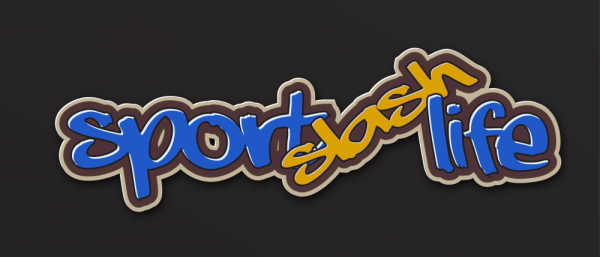


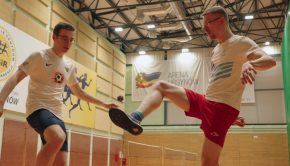
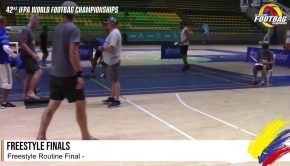
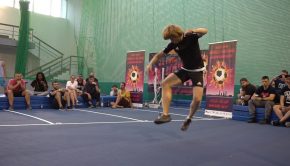
Pingback: 2021 Footbag Joulukalenteri - Lynton Stephens Interview - Sport/Life